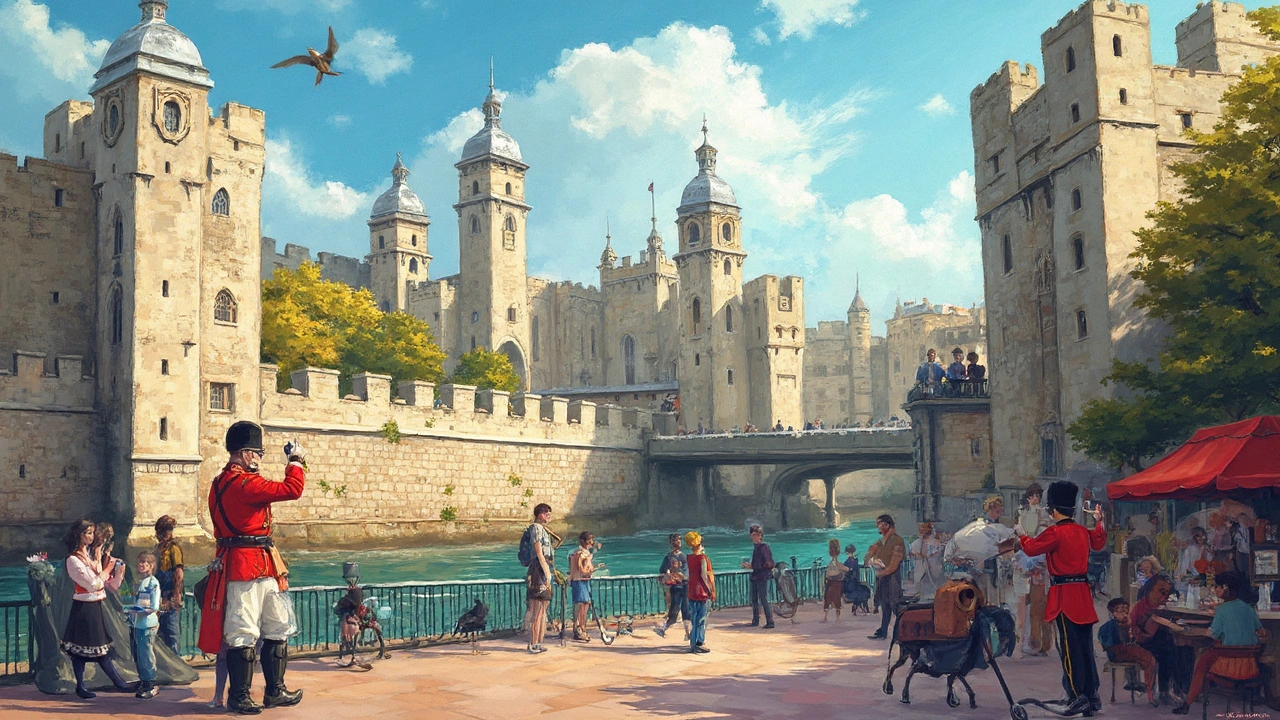When you’re walking along the Thames and spot the Tower of London, you don’t just see an old castle—you’re looking at the city’s original power base. Londoners will tell you it’s not simply another tourist spot; it’s right up there with Borough Market and the West End for authentic London experiences. And if you’ve never been, you’re missing out on the bones of British history, tucked behind those ancient stone walls next to Tower Bridge.
Getting there is a breeze—with Tower Hill tube just steps away and the river bus dropping you off at Tower Pier, it fits perfectly into any sort of London day out. If you live here, it’s worth swinging by outside regular rush hours; weekday mornings outside the school run tend to be less crowded, and you’ll have more time to chat with the Beefeaters (officially Yeoman Warders—yes, they’re real Londoners!). Plus, the Tower is usually busiest between May and September, so if you’re planning with mates or family, that’s something to keep in mind.
- London’s Tower: More Than a Fortress
- Royal Residents and Infamous Prisoners
- The Crown Jewels and Secret Treasures
- Ravens, Legends, and Local Lore
- Best Ways to Explore the Tower
- Tips for a Smooth London Visit
London’s Tower: More Than a Fortress
If you think the Tower of London is just a bunch of old walls, think again. This spot is where British history comes to life, and it’s seen more action than almost any other spot in the capital. William the Conqueror had it built nearly 1,000 years ago, right after he won the Battle of Hastings in 1066. So, if you’re talking about old-school London power, this is as central as it gets.
Throughout its history, the Tower has played a bunch of roles. It’s been a royal palace, an armoury, a prison (for everyone from queens to spies), a treasury, and even London’s original zoo—seriously, lions and polar bears once lived here! Each of these roles left a mark, and you’ll see hints of all that just walking around the grounds.
- The iconic White Tower—the big square building in the middle—is the oldest bit of all. Step inside and you’re literally in the heart of Norman London.
- The Tower was long the safe house for the Crown Jewels, which you can see today, still under tight guard.
- The walls also sheltered monarchs when London was under threat, like during the Peasants’ Revolt in 1381. The Tower’s design made it a last defence for the royals.
It hasn’t just been the rich and famous around here, either. The Tower sits right in central London, and it has always been tied in with Londoners’ everyday life—sometimes as a place to fear, sometimes as a symbol of power, sometimes as a top-tier sight for tourists and locals alike. You can spot London school groups here most Tuesdays, with teachers pointing out the spots where big moments—good and bad—actually happened.
| Quick Facts | Details |
|---|---|
| Founded | 1078 by William the Conqueror |
| Location | Riverside, right by Tower Bridge |
| Annual Visitors | More than 2.5 million |
| Main Structures | White Tower, Bloody Tower, Wakefield Tower |
No matter where you’re from in London, the Tower is one of those landmarks that really brings the city’s stories together. Whether you’re into kings and queens, cold-blooded intrigue, or just want an unbeatable spot for an afternoon walk, it’s got you covered.
Royal Residents and Infamous Prisoners
The Tower of London isn’t just old—it’s packed with stories that put most Netflix dramas to shame. Loads of royals actually lived here. Back in the day, this fortress was where you’d find big names like Henry III and Queen Elizabeth I, especially when London didn’t feel all that safe. It wasn’t just about luxury; it was their stronghold when politics got messy.
But what really grabs attention is the roll call of prisoners locked up inside these walls. Famous faces from British history spent time here (sometimes by choice, sometimes not). Anne Boleyn, one of Henry VIII’s unlucky wives, was held here before her execution in 1536. Her ghost is one of the stories you’ll hear if you join a Yeoman Warder tour.
Sir Walter Raleigh, known for bringing tobacco and potatoes to Britain, spent 13 years here. He even wrote a book while he was jailed—some say he grew grapes on the battlements too. Then there was Guy Fawkes, who plotted the Gunpowder Plot. He ended up in the Tower after the infamous failure on 5 November 1605 (hence all those fireworks every autumn in London).
Here’s a quick way to get your facts straight about royal and infamous folks at the Tower:
- Anne Boleyn: Imprisoned and executed, her burial spot is right in the chapel.
- Lady Jane Grey: Queen for just nine days, then locked up and executed.
- Edward V: One of the "Princes in the Tower," vanished mysteriously along with his brother in 1483.
- Rudolf Hess: Even a Nazi leader landed here for a spell during WWII!
If you’re into crime and scandal, don’t miss Traitors’ Gate. Back in medieval times, boats would float accused prisoners straight under London Bridge, right into the Tower. The Yeoman Warders will happily point it out and share some properly grim stories if you ask.
| Prisoner | Year | Outcome |
|---|---|---|
| Anne Boleyn | 1536 | Executed |
| Sir Walter Raleigh | 1603-1616 | Released then executed |
| Guy Fawkes | 1605 | Executed |
| Lady Jane Grey | 1554 | Executed |
The Tower of London is so much more than just a tourist spot; it’s where the most intense bits of British history played out, sometimes with real blood on the floor. Next time you visit, stand for a minute in the courtyard—imagine who stood right where you’re standing, and what their last thoughts might’ve been before the Tower locked them away for good.
The Crown Jewels and Secret Treasures
If you ask anyone in London what draws over three million visitors to the Tower every year, they’ll almost always bring up the Tower of London’s star attraction—the Crown Jewels. Tucked behind thick security and watched by the Yeoman Warders, this sparkling collection isn’t just for show. The Crown Jewels are handled at coronations, royal weddings, and even the famous State Opening of Parliament, with the Imperial State Crown and the Sovereign’s Sceptre taking centre stage.
The collection packs over 23,000 gemstones, including the famous Cullinan I and II diamonds—the largest clear-cut diamonds on the planet. The Cullinan I alone is about the size of a small egg. And unlike what you see in Hollywood, all that bling is real, in use, and actually still belongs to the monarchy, not the state. Londoners love to tell visitors there’s more gold in the Tower’s vault than you’d see in most bank branches across the UK.
When you’re planning your visit, make the line for the Crown Jewels your first stop—queues get long, especially on weekends and school holidays. If you get there early, you’ll have a better shot at actually peeking at every detail on the crowns and orbs. You’re not allowed to take photos in here, which surprises a lot of people, so take a good hard look and enjoy the moment.
But the showpieces aren’t the only secrets inside the Tower. Some say old coins, war medals, and gifts from foreign royals are also stored on site, but those bits don’t make it into the public display. The Tower’s history as the Royal Mint (back from the 13th to the 19th century) means this place was once full of goldsmiths and craftsmen, hammering out every coin Londoners used long before plastic banknotes took over.
- Tip: Buy timed tickets for the Crown Jewels online. They’re included with general entry, but an early time slot means less waiting around.
- If you’re interested in real London history, the Tower also features interactive displays about the Royal Mint, showing old coins and how they were made—kids especially love this bit.
| Interesting Fact | Details |
|---|---|
| Number of Jewels | Over 23,000 pieces in the Crown Jewels collection |
| Queen’s Crown Weight | Nearly 1.06 kg—so heavy the Queen jokes about wearing it |
| Oldest Piece | Spoon used for anointing at coronations, dating back to the 12th century |
There’s no other spot in London where you’ll find this much royal history and real-life sparkle in one place. And trust me, seeing the Crown Jewels up close beats looking at photos online any day.

Ravens, Legends, and Local Lore
It’s impossible to talk about the Tower of London without bringing up the ravens. Locals and London guides will both swear by the story: if the ravens ever leave the Tower of London, the kingdom will fall. It sounds like something out of a movie, but the tradition runs deep. Right now, at least six ravens live on site—each looked after by the Ravenmaster, who’s part of the Yeoman Warders team. If you want to see them up close, head over to the green next to the White Tower in the morning, before the big crowds pile in.
Each raven has a name, a bit like London’s black cabs having a history. Current stars include Poppy, Edgar, and Harris, with profiles listed on the Tower’s official website. They’ve even got their own Twitter (sorry, X) account—how’s that for iconic London birds?
Beyond birds, the Tower of London is loaded with legendary stories. Everyone’s heard about the ghosts—Anne Boleyn is said to be the famous headless spectre seen near the Chapel Royal. But the place is also full of not-so-scary lore. Did you know the Yeoman Warders have their own pub onsite called The Keys? It’s not open to the public, but it’s a classic bit of Tower insider info—Warders knock back a pint there after the nightly Ceremony of the Keys (which you can actually book to watch online, but spots fill up months in advance).
- Legend: Guy Fawkes was questioned and tortured here after the Gunpowder Plot—official Tower guides love sharing the real spot.
- Fact: 22 executions took place on Tower Green, a hidden area most first-timers walk past without realising its bloody history.
- Tip: Look for graffiti carved by prisoners in the Beauchamp Tower. You’ll find real Tudor names scratched into stone, and it’s free with your entry ticket.
Ever fancied seeing the stats on raven residency? Here’s a snapshot of the current crew:
| Name | Year Arrived | Fun Fact |
|---|---|---|
| Poppy | 2019 | Loves hiding keys |
| Harris | 2017 | Known escape artist |
| Grip | 2020 | Big fan of tourists' snacks |
For Londoners, these stories and quirky details set the Tower apart from any other London attractions. It’s not just about the grand history. It’s about weird birds, old myths, and the bits of culture you only get if you pay proper attention and ask questions on your next visit.
Best Ways to Explore the Tower
It’s easy to get lost in the stories at the Tower of London, but you’ll want a game plan to get the most out of your visit. Locals swear by getting there early—right as the gates open at 9am (10am on Sundays and Mondays). That’s when crowds are thin and you can actually peek at the Crown Jewels without shuffling through the masses.
If you’re after all the good stories (the kind your history teacher skipped), join one of the Yeoman Warder guided tours. These Beefeaters have seen it all and know secret bits that don’t show up on any info boards. Here’s something a Beefeater told The Guardian:
“We’ve got over a thousand years of history to cover, but it’s the personal tales and the little things you spot—like graffiti scratched by prisoners—that make the Tower special.”
For the full-on London attractions experience, bring your headphones and download the official audio guide. It’s packed with stories you won’t find anywhere else (including weird tales about the ravens and the lost royal menagerie). Don't bother with paper maps—just follow the numbered plaques, and you won’t get turned around.
- Hit the hot spots first: See the Crown Jewels before 10:30am—queues can hit an hour by lunchtime, even on dull days.
- Plan for ramps and steps: Much of the site is old and uneven, but wheelchair users can borrow ramps from staff. The main parts are accessible, even if the White Tower itself has tough stairs.
- Take your time in the Bloody Tower: It’s usually quieter mid-afternoon, perfect if you want to mull over the fate of the princes or snap some ghostly photos for the group chat.
- Don't skip the Wall Walk: The views of the city and river are ace, and there are loads of nooks most tourists miss.
If you want to dodge all the big crowds, late autumn is quieter and has just as much atmosphere. Some Londoners even say October is the best month to come—clear, crisp, and just creepy enough.
| Spot | Average Queue Time (Peak Hours) |
|---|---|
| Crown Jewels | 45-60 minutes |
| White Tower | 20-30 minutes |
| Yeoman Warder Tours | Runs every 30 minutes, no queue |
Small tip: If you’ve got a London Pass, use it for fast-track entry—especially on weekends or bank holidays. And if you’re local, check out annual membership deals; it gets you unlimited visits and sometimes those evening events, like ghost tours or live reenactments, that most people have never heard of.
Tips for a Smooth London Visit
If you want to get the most out of the Tower of London, a bit of planning makes all the difference. Here’s how locals and smart visitors make it work.
- Buy tickets online before you go. It saves you standing in the notorious queues, especially during school holidays and on weekends. The official Historic Royal Palaces website often runs discounts and has real-time availability.
- If you’re using public transport, the Tower Hill station (Circle and District lines) is right opposite the main entrance. If you’re coming by river, Uber Boat by Thames Clippers drops you at Tower Pier. Avoid driving; London traffic and congestion charges aren’t worth the stress.
- For a more peaceful visit, show up right when the gates open (usually 9am or 10am, depending on the season). Early birds get the place much quieter and easier selfie moments in front of the White Tower.
- Pack light. Bags are checked on entry, and there’s no cloakroom on-site. Water bottles can be refilled inside, and the Raven Café does a decent coffee and pastries—plus sausage rolls for a quick Brit snack.
- If you’re after a special experience, join a Yeoman Warder tour. They’re included with your ticket and are loaded with the kind of cheeky stories you won’t find on Wikipedia.
| Tower of London Visitor Basics | Details |
|---|---|
| Opening Times | Tue-Sat 09:00-17:30, Sun-Mon 10:00-17:30 (last admission: 16:30) |
| Average Visit Length | 2.5-3 hours |
| Peak Days | Fridays, weekends, school holidays |
| Nearest Tube | Tower Hill (Zone 1) |
| Food Options | Raven Café (on-site), nearby: Pret, Wagamama, Pizza Express |
Families can grab free children’s activity trails at the entrance—great for occupying kids who might otherwise get bored by centuries-old stonework. If you’re after something even more memorable, check the Tower’s website for special events like the Ceremony of the Keys (the famous nightly lock-up ritual) or pop-up exhibitions about British history.
Lastly, wear comfy shoes. There’s a lot of uneven ground and quite a few stairs. And if the British weather does its usual thing, best tuck a light raincoat or brolly in your bag—you’re in London, after all.




